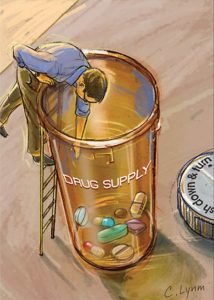By Deron Hamel
Tina Smith has seen the negative impact seizure medication shortages have on people living with epilepsy and their families – she and her son, Nicholas, have lived through it more than once.
 Fifteen-year-old Nicholas had his first tonic-clonic seizure at seven. In 2009, Nicholas was diagnosed with epilepsy. During the next several years his condition became increasingly severe. He was experiencing tonic-clonic seizures lasting up to five minutes. At one point, Nicholas began having 20 to 40 absence seizures per hour.
Fifteen-year-old Nicholas had his first tonic-clonic seizure at seven. In 2009, Nicholas was diagnosed with epilepsy. During the next several years his condition became increasingly severe. He was experiencing tonic-clonic seizures lasting up to five minutes. At one point, Nicholas began having 20 to 40 absence seizures per hour.
Doctors eventually found a medication combination that controlled Nicholas’s seizures. One of these anti-seizure medications is clobazam, a drug that has had several supply shortages in the past three years.
These shortages have had a devastating impact on Nicholas and Tina. Like many medications, clobazam requires an adaptation period – both coming on and going off the drug.
During one clobazam shortage, Tina, a pharmaceutical technician, was able to secure a small amount of the medication from a pharmacy – a 25-minute drive away. After this, Nicholas was prescribed a substitute medication, clonazepam, but it made his seizures worse.
Eventually, Tina found clobazam at another pharmacy, but it was a two-hour drive away which made access challenging.
There is currently another clobazam shortage – and Tina only found out about it when she went to renew Nicholas’s prescription.
“When I went in to order it and I saw there was nothing … my stomach dropped,” she tells Voices of Epilepsy. “I felt like couldn’t breathe. I thought, ‘He is going to go through this all over again.’”
Clobazam has made a difference in Nicholas’s quality of life. He has not had a tonic-clonic seizure since April 7, 2014. He attends school. He might even qualify to get a driver’s licence when he turns 16 later this year. Tina says these things were “never in the picture” before.
“But if (we cannot obtain) clobazam, we will end up where we were last time,” Tina says. “Will he be able to get a driver’s licence? Of course not, because he will be seizing again. Will he be able to work? Or get a post-secondary education? No, because he will be seizing.”
If there is one thing Tina says she hopes pharmaceutical companies understand about seizure medication shortages, aside from the health impact they have on people living with epilepsy, it’s the anxiety and stress families go through.
A recent Voices of Epilepsy article highlighted the need for drug manufactures to go beyond reporting medication shortages and explain the reasons behind shortages so the underlying issues can be addressed.
Tina agrees that reporting drug shortages isn’t enough.
“I don’t want to go through this again,” she says. “I don’t want my son to go through this again, so why aren’t we fixing the problem?”
If you have feedback on this story, or have a story of your own that you would like to share, please contact the newsroom at 800-294-0051, ext. 23, or e-mail deron(at)axiomnews.com. You can also leave a comment below.





